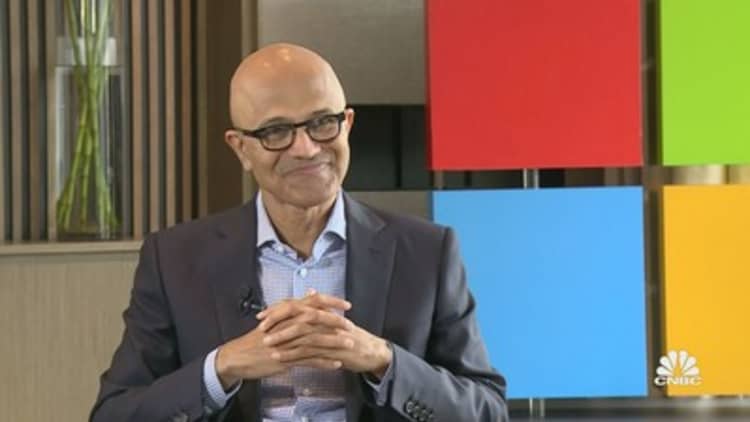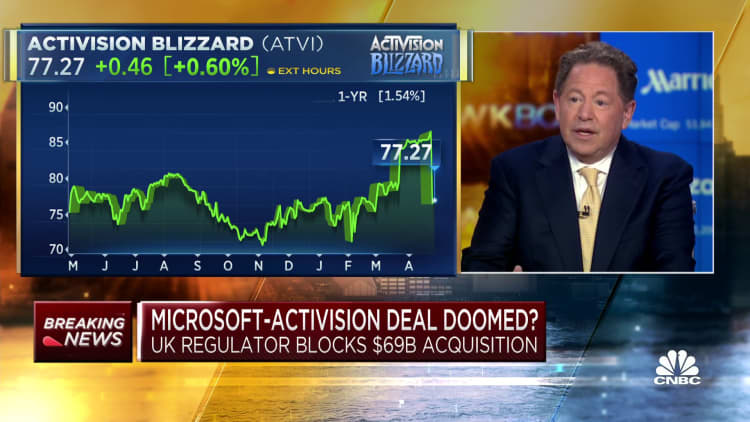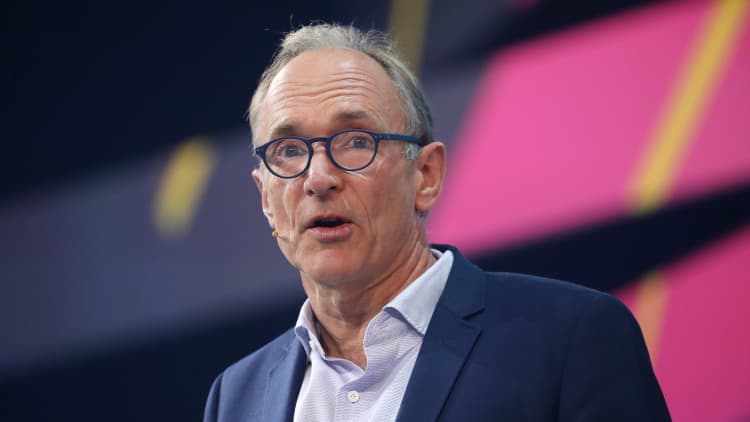Microsoft has invested huge amounts of capital and time into making cloud gaming a core part of its gaming offering.
Peter Summers | Getty Images
When Microsoft announced its offer to buy Activision Blizzard for $68.7 billion, it marked one of the biggest acquisitions in video game history — and the largest-ever deal for the Redmond, Washington-based technology giant.
There were lots of reasons for the U.S. tech giant to buy Activision. Activision owns a multitude of popular game franchises — Call of Duty, World of Warcraft, and Candy Crush Saga.
Microsoft would gain a host of content to add to its Xbox gaming division. And it would add a slew of talent to its in-house game studios that could help with developing new games.
But the key one, and the thing Microsoft is betting its gaming future on, was cloud gaming — and that’s what ultimately threw a spanner in the works for the company’s multibillion-dollar bid to swallow Activision when U.K. regulators chose to block the deal Wednesday.
What is cloud gaming?
Cloud gaming is a technology that lets people play games from any device with an internet connection – a console, PC, smart TV, or a mobile phone — from a far-flung data center.
Traditionally, you’d need some dedicated hardware to play a game, like an expensive console or PC.
Things have gotten better over time with advances in smartphones, and there are now even major studio-quality games that can be played on phones, like Call of Duty Mobile.
But what cloud gaming offers — that makes it a differentiator — is a service on which you can stream a selection of titles in real time from a company’s remote data centers, just like you would a movie or TV show on Netflix.
Microsoft has invested huge amounts of capital and time into making cloud gaming a core part of its gaming offering. The company added cloud gaming as a free perk within its Xbox Game Pass subscription product, which offers people access to a multitude of titles for a monthly fee.
Cloud gaming could benefit consumers in developing markets where consoles and PCs are too expensive to own.
Microsoft has lost ground to console rivals — particularly Sony — over the years. In the last generation of consoles, Sony won the infamous “console wars” with its PlayStation 4 machine, which topped Microsoft’s Xbox One in terms of lifetime sales.
With the current generation of consoles, which were launched in November 2020, it has been more of the same. The PS5 has sold 32 million units to date, according to its latest quarterly numbers.
Microsoft doesn’t publish unit sales in its results, however an estimate from the video game data website VGC places lifetime sales of its Xbox Series X and S consoles just north of 20 million units.
Microsoft CEO Satya Nadella outlined the vision the company has for cloud gaming and its incorporation of Activision Blizzard in an interview with CNBC’s Tanvir Gill in November.

“We want people to be able to enjoy the games they love on platforms they are playing in. And that’s our goal,” Nadella said.
“We love the console, the Xbox, we love the PC, we love mobile. We love xCloud, which is the streaming service, so that you can even play on your television and what have you.”
“Activision is a fantastic partner of ours today that we want to be able to sort of take all the content and make sure it’s available on every platform,” he added.
Why the CMA is concerned
In its merger review published Wednesday, the CMA said that it was concerned Microsoft’s dominance of cloud gaming could hurt competition in that particular market.
“Allowing Microsoft to take such a strong position in the cloud gaming market just as it begins to grow rapidly would risk undermining the innovation that is crucial to the development of these opportunities,” the CMA said in a press release Wednesday.
Microsoft takes up 60-70% of the overall cloud gaming market, according to the regulator.
The CMA — in addition to other regulators and rivals like Sony — fear that Microsoft could in future withhold its blockbuster Call of Duty, Warcraft and Diablo titles from other cloud gaming platforms.
Call of Duty is Activision Blizzard’s crown jewel, selling huge numbers every year. Its Warzone battle royale multiplayer mode alone was played by more than 6 million people in the first 24 hours of its release.
That makes it an extremely attractive asset for a company like Microsoft. Think of it like Nintendo announcing it was going to buy Electronic Arts, and it had a subscription service you could pay $10 a month for to play every new FIFA soccer game the day it came out.

In addition to Xbox, Microsoft also owns Azure, the cloud computing platform, which is used by thousands of companies for their data storage and computing power needs.
“While Microsoft has formed partnerships with third party cloud gaming providers to bring select ABK titles to their services, this does not necessarily mean these companies will be receiving unrestricted access to those games by default,” analyst firm Omdia said in emailed comments to CNBC.
“There will still be licensing terms, fees and conditions that operators have to pay – fees which Microsoft will have absorbed in a different way as part of the acquisition itself.”
“Microsoft also owns the Azure infrastructure that powers Xbox Cloud Gaming and other third party cloud services, who will be paying for every minute and every user provided by the Azure backend,” Omdia added.
“This should ensure that ten years down the line – when cloud gaming has a much larger addressable market – Microsoft will face lower operating costs than competing services.”
Cloud gaming isn’t perfect
Ultimately though, cloud gaming is still in its infancy. The technology requires a strong internet connection to function well, otherwise gamers face drops in performance and latency issues.
Shooters and fighting games are particularly demanding in terms of responsiveness.
Google notably killed its cloud gaming service, Google Stadia, in September only three years after launching it following struggles to find the right product-market fit for the platform.
Cloud gaming also isn’t a huge market. Cloud-enabled gaming services generated $5.1 billion of revenue in 2022, according to data from Omdia, less than 15% of the $35 billion made by console game sales.
But the CMA’s worry is that Microsoft could throttle the industry going forward as it becomes a more mass market technology. Cloud gaming revenues tripled in 2022 year-on-year, according to the CMA.
“What the CMA is doing is taking a forward-looking view on the matter, taking into account concerns of where cloud gaming lands in the future, relative to its small size today,” Omdia said.
“Our projection is that cloud gaming is growing rapidly, with revenue more than doubling by 2026.”
WATCH: Three decades after inventing the web, Tim Berners-Lee has some ideas on how to fix it

 EU News Digest Latest News & Updates
EU News Digest Latest News & Updates



